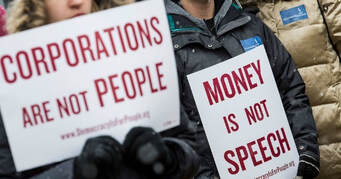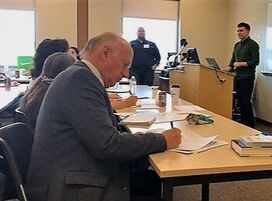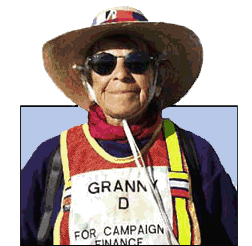Big Money in Politics - An Issue with Devastating Impact
|
Olivia Zink, Executive Director of Open Democracy, was a guest at one of our committee meetings in 2020. Open Democracy is working in New Hampshire to create an open, accountable, and trusted democratic government free from the corrupting influence of big-money politics. Watch Olivia's presentation on Youtube.
|
The Devastating Impact of Big Money in Our Elections
At the heart of every issue, and at the core of everything our government in the last ten years has done or failed to do, we must consider how much political influence was exerted on lawmakers by the unrestricted flow of Big Money in U.S. elections. To what extend has loyalty to the donor class among our elected officials affected decision-making or caused our present-day gridlock? It is not a conundrum officials wished upon themselves; it is a reality most would prefer to extinguish, because they must spend, on average 4 hours a day dialing for dollars, and often face the wrath of donors who expect a quid-pro-quo.
The U.S. Supreme Court decision in Citizens United v Federal Elections Commission in 2010 by its 5 - 4 Republican-appointed jurists repealed, in a single ruling, 100 years of campaign finance regulations. Ten years of opened floodgates to political spending has spawned non-stop electioneering by corporations and wealthy individuals. Adding further to the diminished value of our votes through Big Money contributions, foreign and domestic, Mr. Trump has publicly solicited election assistance from nations that are adverse to our national interests to manipulate the 2020 election to assure his ascendancy to a second term in office.
Imagine a Congress dedicated to discovering a way to prevent or cure Alzheimer's disease; devoted to legislation allowing the government to negotiate for lower drug prices; deciding high-speed rail more important than colonizing the moon; mitigating climate change rather than protecting the fossil fuel industry. Imagine the possibilities if we worked boldly to unshackle our elected officials from the bonds of Big Money!
One way to stem this wave of legalized bribery by monied interests is to pressure Congress, beginning at the local level, town by town, to pass the 28th Amendment to the U.S. Constitution, allowing states to once again regulate money in politics as it was once able to do beginning with the Tillman Act of 1907. As of this writing, approximately 80 New Hampshire municipalities have successfully passed such a petition at their annual public meetings.
Legislation to allow voluntary public funding of elections is a different approach that has a greater impact. Maine, Arizona, Connecticut, and dozens of municipalities have pass these regulations, Seattle and New York City among them. New Hampshire Senate Bill 304 creating a voluntary voucher system of campaign funding lives in a study committee.
Another is to require timely registration and strict reporting of political spending - transparency - so voters can know who is attempting to influence our elections, and to what extent. Transparency in political spending is not just authorized by Citizens United, it is encouraged. However, bills requiring transparency and fix loopholes in existing law were vetoed this term by Gov. Sununu. Since the percentage of the U.S. population making political contributions is less than one half of one-percent (0.47%), corporations are happy to fill the void.
These movements are not about challenging the 1st Amendment; rather it is a grassroots and legislative effort to preserve national political autonomy, our representative Democracy, and free our elected officials so they may better serve you and me, instead of their contributors. Watch the video about this created by a NH campaign finance reform advocate. It is worthy of your time to watch.
Both the New Hampshire House and Senate passed HB 504, a bill that would allow Congress and state legislatures to regulate the role of money in elections and governance to ensure transparency, prevent corruption, and protect against the buying of access to or influence over representatives. But for Gov. Sununu's veto, New Hampshire would have become the 20th state to essentially overturn the Citizens United court ruling. The legislature was not able to override the veto by the required 2/3 majority.
- Bob Perry
The U.S. Supreme Court decision in Citizens United v Federal Elections Commission in 2010 by its 5 - 4 Republican-appointed jurists repealed, in a single ruling, 100 years of campaign finance regulations. Ten years of opened floodgates to political spending has spawned non-stop electioneering by corporations and wealthy individuals. Adding further to the diminished value of our votes through Big Money contributions, foreign and domestic, Mr. Trump has publicly solicited election assistance from nations that are adverse to our national interests to manipulate the 2020 election to assure his ascendancy to a second term in office.
Imagine a Congress dedicated to discovering a way to prevent or cure Alzheimer's disease; devoted to legislation allowing the government to negotiate for lower drug prices; deciding high-speed rail more important than colonizing the moon; mitigating climate change rather than protecting the fossil fuel industry. Imagine the possibilities if we worked boldly to unshackle our elected officials from the bonds of Big Money!
One way to stem this wave of legalized bribery by monied interests is to pressure Congress, beginning at the local level, town by town, to pass the 28th Amendment to the U.S. Constitution, allowing states to once again regulate money in politics as it was once able to do beginning with the Tillman Act of 1907. As of this writing, approximately 80 New Hampshire municipalities have successfully passed such a petition at their annual public meetings.
Legislation to allow voluntary public funding of elections is a different approach that has a greater impact. Maine, Arizona, Connecticut, and dozens of municipalities have pass these regulations, Seattle and New York City among them. New Hampshire Senate Bill 304 creating a voluntary voucher system of campaign funding lives in a study committee.
Another is to require timely registration and strict reporting of political spending - transparency - so voters can know who is attempting to influence our elections, and to what extent. Transparency in political spending is not just authorized by Citizens United, it is encouraged. However, bills requiring transparency and fix loopholes in existing law were vetoed this term by Gov. Sununu. Since the percentage of the U.S. population making political contributions is less than one half of one-percent (0.47%), corporations are happy to fill the void.
These movements are not about challenging the 1st Amendment; rather it is a grassroots and legislative effort to preserve national political autonomy, our representative Democracy, and free our elected officials so they may better serve you and me, instead of their contributors. Watch the video about this created by a NH campaign finance reform advocate. It is worthy of your time to watch.
Both the New Hampshire House and Senate passed HB 504, a bill that would allow Congress and state legislatures to regulate the role of money in elections and governance to ensure transparency, prevent corruption, and protect against the buying of access to or influence over representatives. But for Gov. Sununu's veto, New Hampshire would have become the 20th state to essentially overturn the Citizens United court ruling. The legislature was not able to override the veto by the required 2/3 majority.
- Bob Perry



